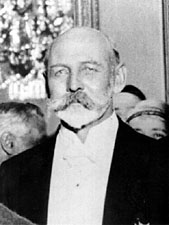Joseph Cook
Sir Joseph Cook , GCMG PC (born December 7, 1860 in Silverdale , Staffordshire , England , † July 30, 1947 in Sydney , New South Wales , Australia ) was an Australian politician and the 6th Prime Minister of Australia . His term of office lasted from June 24, 1913 to September 17, 1914.
Life
First years
Cook was born in Silverdale , Staffordshire , a small mining town near Newcastle-under-Lyme in the United Kingdom . He did not have a regular school education because he had to work in the coal mines from the age of nine. He married Mary Turner in 1885 and shortly afterwards left the country for New South Wales.
In Lithgow , Australia , he settled with his wife and worked in the coal mines there, whereupon he became general secretary of the Western Miners Association in 1887 . In 1888 he took part in the demonstrations against the increasing immigration of Chinese workers. He was also active in the Single Tax League and a founding member of the Australian Labor Party (ALP) in 1891, which emerged from a labor movement.
Political career
Cook was elected to the Parliament of New South Wales in 1891 for the Australian Labor Party, immediately after its founding, where he represented the coal region around Hartley. This was the first parliamentary seat the Australian Labor Party ever reached in its history. In 1894 he belonged to the group that resisted the plan of the party leadership to accept an imperative mandate by self-commitment , whereupon he left the party after only three years. He now joined the Free Trade Party (FT) , which was led by the future Prime Minister George Reid .
houses of Parliament
When the Commonwealth of Australia was founded in 1901, Cook was elected in the Parramatta constituency, which also included the area around Lithgow. He became Reid's deputy during his tenure as Prime Minister 1904-05, but without receiving a portfolio, mainly because Reid had to offer posts to independent members of the Protectionist Party. When Reid resigned from the party leadership in 1908, Cook agreed to merge the Free Trade Party with Alfred Deakin 's protectionists and became vice chairman of the Commonwealth Liberal Party .
During Deakin's reign, 1909–1910, Cook served as Secretary of Defense , replacing Deakin as Liberal leader after the 1910 election defeat.
prime minister
During the 1913 elections he was able to achieve a wafer-thin majority of one seat in the House of Representatives, while Labor won a majority in the Senate. Cook became Australia's sixth Prime Minister . However, since he could not carry out his government business without the control of the Senate, Cook used section 57 of the Constitution of Australia , according to which the governor-general can dissolve both houses if the Senate repeatedly rejects bills.
During the campaign for the 1914 elections, World War I broke out and his political opponent, Labor Party, managed to convince voters that his party had always been in favor of the creation of independent Australian forces while the Conservatives had voted against it. Because of the general uncertainty, the Fishers party won.
Nationalist Party
In 1916, the Labor government collapsed after Fisher's successor, Billy Hughes , attempted to introduce universal conscription in Australia . Cook became Hughes 'deputy in the new Nationalist Party of Australia and Secretary of the Navy in Hughes' government. The nationalists had great success in the 1917 and 1919 elections. For Australia, Cook took part in the Paris Peace Conference in 1919 . There he defended the Australian policy of only allowing white immigrants into the country, and endeavored to annex German New Guinea , which was later placed under Japanese and Australian mandates. In the legislative period of 1920/21 he was Minister of Finance .
Cook resigned in 1921 and became his country's High Commissioner in London , where he served in that position until 1927. From 1928 to 1929 he headed a parliamentary committee of inquiry (Royal Commission) in the province of South Australia . He died in Sydney in 1947 at the age of 86 .
Awards
On July 16, 1914, Cook was appointed to the Privy Council . He was also knighted in 1918 as the Knight Grand Cross of the Order of St Michael and St George (GCMG). The Australian polar explorer Douglas Mawson named the Cook Ice Shelf in his honor .
Web links
Individual evidence
- ^ A b c F. K. Crowley: Cook, Sir Joseph (1860-1947) . In: Australian Dictionary of Biography . Australian National University . Retrieved April 3, 2007.
- ↑ a b c Joseph Cook . In: Australia's Prime Ministers . National Archives of Australia . Archived from the original on February 26, 2007. Info: The archive link was automatically inserted and has not yet been checked. Please check the original and archive link according to the instructions and then remove this notice. Retrieved April 3, 2007.
- ^ Sir Joseph Cook (1860-1947) . In: Members of Parliament . Parliament of New South Wales. Retrieved April 3, 2007.
- ^ The London Gazette , July 17, 1914
- ^ The London Gazette, August 6, 1918
| personal data | |
|---|---|
| SURNAME | Cook, Joseph |
| BRIEF DESCRIPTION | Australian politician and prime minister |
| DATE OF BIRTH | December 7, 1860 |
| PLACE OF BIRTH | Silverdale , Staffordshire, England |
| DATE OF DEATH | July 30, 1947 |
| Place of death | Sydney , New South Wales, Australia |



